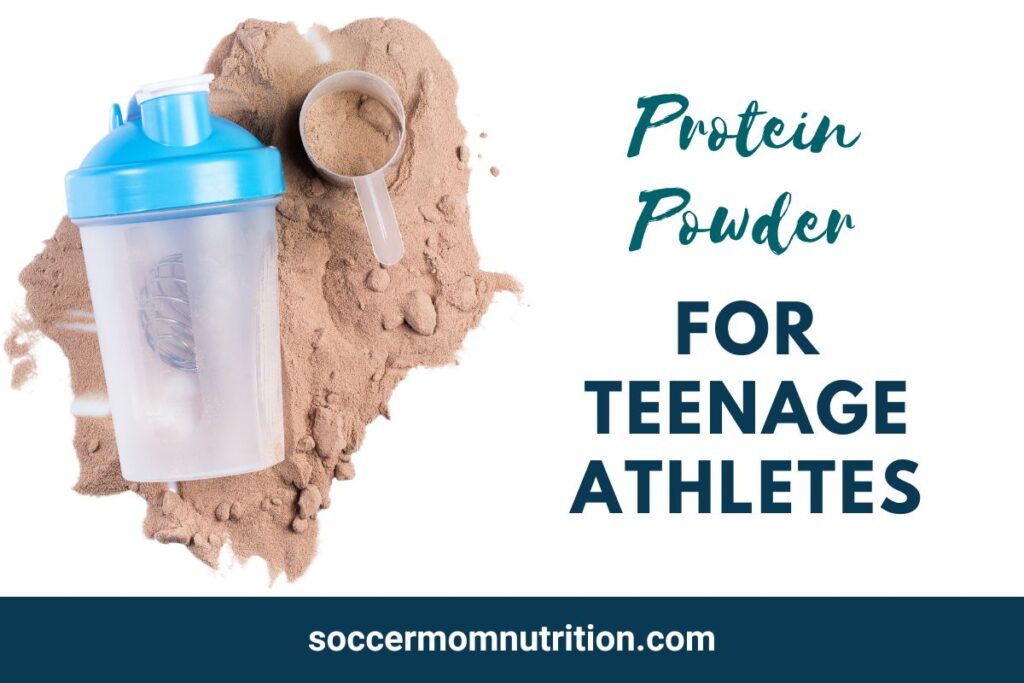Protein Powder for Teenage Athletes: What You Need to Know
Should you consider including protein powder for teenage athletes sports nutrition performance plans?
Teenage athletes need to fuel with the right nutrients to support growth, development, and athletic performance.
Protein is an essential nutrient that plays a key role in building and repairing muscle tissue. So it’s important for athletes who are pushing their bodies for optimal performance.
When possible you should try to get your protein needs through whole foods like chicken, fish, soy, legumes and eggs.
However, protein powder can be a convenient and effective way to add protein to your diet and ensure that you’re getting enough protein to support your sports performance needs.
In this post, we’ll explore the benefits of protein powder for teenage athletes, and give you some tips for choosing the right product.

Benefits of protein powder for teenage athletes
Protein powder can offer a number of benefits for teenage athletes, including:
1. Increased muscle protein synthesis
Protein powder is a convenient way to ensure you’re meeting your protein needs, since adequate protein stimulates muscle protein synthesis.
This process involves the repair and growth of muscle tissue, which is essential for athletes who are looking to build strength and endurance to improve performance.
2. Improved recovery
When you exercise, your muscle tissue gets tiny micro tears. Eating protein or a protein shake after a game, practice or workout can help to repair this damage and speed up your recovery time.
This helps you to train harder and more frequently since your body is adapting to the training. Be sure to add a carbohydrate with protein to improve recovery. (1)
3. Convenience
Protein powder is an easy and convenient way to get the protein you need, especially when you’re on the go or don’t have time to prepare a meal. It can be added to smoothies, shakes or even mixed with water for a quick and easy protein boost.
Choosing the Right Protein Powder
When it comes to choosing the right protein powder, there are a few things to consider:
1. Protein source
The most common sources of protein powder are whey, casein and plant-based proteins like pea or soy.
Whey protein is a popular choice because it is easily absorbed by the body and contains all of the essential amino acids. Casein protein is slower-digesting, which can provide a sustained release of amino acids over time. (2)
Plant-based proteins are a good option for athletes who are vegan or have food allergies. Generally you’ll want to choose get a blend of plant based proteins
2. Ingredients
It’s important to choose a protein powder that is free from artificial flavors, colors, and sweeteners like monkfruit or stevia, as well as any other unnecessary additives or fillers. These might cause digestive issues and
Look for products that have a short ingredient list and are free from allergens if you have any food sensitivities. Another thing to watch for is “proprietary blends” as these blends don’t tell you how much of an active ingredient is actually in the protein powder.
3. Quality
Choose a protein powder from a reputable brand that is known for producing high-quality supplements. Look for products that have been independently tested and verified by third-party organizations like NSF International, Informed Sport or Informed Choice.
4. Macronutrient profile
Depending on your goals, you may want a protein powder that is high in protein and low in carbohydrates and fat, or you may prefer a more balanced macronutrient profile. Be sure to choose a protein powder that fits your individual sports nutrition goals.
5. Consult with a healthcare professional
Before adding any supplements to your diet, it’s important to consult with a healthcare professional or sports dietitian to ensure that it is safe and appropriate for your age and individual needs.
Conclusion
Protein powder can be a helpful supplement for teenage athletes who need to increase their protein intake to support their growth and athletic performance.
When choosing a protein powder, be sure to consider the protein source, ingredients, quality, macronutrient profile, and consult with a healthcare professional.
With the right protein powder and a balanced diet, you can fuel your body for success on and off the field.
Join our mailing list and get our FREE Pre-Activity Fueling Guide.
Stephanie Magill, MS, RD, CD, FAND has over 22 years of experience in public health and nutrition. As a performance registered dietitian nutritionist, Stephanie specializes in sports nutrition and provides simple and actionable information so that athletes can be well fueled for high performance on and off the field. Stephanie has a Master’s Degree in Nutrition and is a Fellow of the Academy of Nutrition and Dietetics.

